Annual Regional Sustainable Development Conference 2024
“LOCAL GOVERNANCE, DIGITAL TRANSFORMATION, AND REGIONAL SUSTAINABLE DEVELOPMENT”
CALL FOR COMMUNICATIONS
“Regional sustainable development” is an issue that attracts the interest of academic researchers, policy-makers, and other stakeholders. The Institute of Social Sciences of the Central Region (ISSCR) and the EM Normandie Business School are organizing the third edition of their conference on the nexus between “Local Governance, Digital Transformation, and Regional Sustainable Development” in Da Nang (Vietnam), on 11-12 July, 2024. Very especially, we celebrate this year the 20th anniversary of the ISSCR. The conference aims to promote scientific research on sustainable growth and its implications for regional development, focusing on the role of local governance and digital transformation.
Focus topics
Papers proposed could include the following topics (not limited to):
- Local Governance, Digital Transformation, and Attractiveness
- Local Governance, Digital Transformation, and Poverty Reduction
- Local Governance, Circular Economy, and Sustainability
- Digital Transformation, Innovation, and Sustainable Growth
- Local Governance, Vulnerability, and Resilience
- Local Governance, Digital Transformation, Leadership, and Sustainability
- Local Governance, Digital Transformation, and Maritime Economy
Round table
A mini economic forum on “Development of Maritime Economy in Central Vietnam: Challenges and Prospects.”
Participants: EM Normandie Business School, Institute of Social Sciences of the Central Region, and local agencies and managers.
Submission
Please send an extended abstract or full manuscript through the following website:
http://aissc.org.vn/
While submitting, please specify the topic where the manuscript would be presented in case of acceptance.
Accepted Languages: Vietnamese + English
Important dates
Deadline submission for extended abstract or full paper: April 19th, 2024 Paper notification to authors: May 31st, 2023
Registration open: May 2nd, 2023
Conference Board
- CASTELLANO Sylvaine, Dean of Faculty and research, EM Normandie Business School, France
- HOANG Hong Hiep, Director, Institute of Social Science of the Central Region, Vietnam
- NGUYEN-HUU Thanh Tam, EM Normandie Business School
- TRAN Minh Duc, Vice Director, Institute of Social Science of the Central Region, Vietnam
Scientific Committee
- BOURDIN Sébastien, EM Normandie Business School, France
- BUI Quang Tuan, Director of Vietnam Institute of Economics, Vietnam
- CILLO Valentina, University of Rome “Link Campus”, Italy
- CONDOR Roland, EM Normandie Business School, France
- DEL GIUDICE Manlio, Editor in Chief of Journal of Knowledge Management, Pegaso Digital University , Italy
- DANG Xuan Thanh, Vice Director of Vietnam Academy of Social Science, Vietnam
- ESTAY Christophe, Research and Academic Director, FERRANDI Paris, France
- FARINA Briamonte Massimiliano, University of Rome 3, Italy
- FIANO Fabio, University of Rome “Unicamillus”, Italy
- LAMOTTE Olivier, EM Normandie Business School, France
- JUTEAU Solène, EM Normandie Business School, France
- LARÉ Amandine, Head of Economics, Territories and Sustainable Development Department, EM Normandie Business School, France
- LE Quoc Hoi, Editor in Chief of Journal of Economics and Development, National Economics University, Vietnam
- LE Van Cuong, Associate Editor of Journal of Public Economics Theory, CNRS, Paris School of Economics, France
- LE Van Hung, Vice Director of the Institute of Regional Sustainable Development, Vietnam
- LUONG Tinh, Institute of Social Science of the Central Region, Vietnam
- NAM Sang-Woo, KDI School of Public Policy and Management, Korea
- NGUYEN Truong Son, The University of Danang - University of Economics, Vietnam
- NGUYEN Van Phu, Paris Nanterre University, France
- PALLADINO Rosa, IUL Digital University, Italy
- PAPA Armando, University of Salerno, Italy
- PARK Jin, KDI School of Public Policy and Management, Korea
- PHAM Hoang Van, Hankamer School of Business, Baylor University, United States
- PHAM Si An, Vietnam Academy of Social Sciences, Vietnam
- PHAM Thi Kim Cuong, Paris Nanterre University, France
- PHAN Thi Song Thuong, Institute of Social Science of the Central Region, Vietnam
- RIEBER Arsène, University of Rouen Normandy, France
- TRAN Nam Binh, University of New South Wales, Australia
- TRAN Thi Anh-Dao, University of Rouen Normandy, France
- TRINH Thi Thu, Institute of Social Science of the Central Region, Vietnam
- VENKATESH V.G., EM Normandie Business School, France
- VU Bang Tam, University of Hawaiʻi at Hilo, America
- WON Hee Lee, Han Kyong University, Korea
Local organization committee
- HOANG Hong Hiep
- TRAN Minh Duc
- TRAN Thi Thuy Duong
- BUI Nguyen Hoa
- VO Hoang Phi
- LE Xuan Thong
- TRINH Thi Thu
- PHAN Thi Song Thuong
- LUONG Tinh
- TONG Thi Hai Hanh
- NONG Thi Dieu
- DINH The Toan
- VO Thi Bich Tram
- NGUYEN Hoang Yen
Time and Venue
- Time: July 11thand 12th, 2024.
- Venue: Institute of Social Sciences of the Central Region, Nam Ky Khoi Nghia Street, Ngu Hanh Son District, Da Nang City, Vietnam.
1 day (or 2 days) + 1 day trip: to be confirmed
- 11/7/2024: All-day conference.
- 12/7/2024: Round table (in the morning) and Trip (in the afternoon).
EMN and the Métis lab
Founded in 1871 among the first French business schools, EM Normandie has established itself as a benchmark institution in the world of business schools. It holds the international EQUIS, AMBA, and AACSB accreditations.
With 6,300 students and professionals in its initial and continuing diploma training programs and 23,000 members of the Alumni EM Normandie association worldwide, the school has six campuses (three in France: Caen, Le Havre, and Paris, three abroad: Oxford, Dublin, and Dubai, and two associated: La Martinique and La Réunion). EM Normandie trains the managers of tomorrow, future responsible rulers prepared to lead change in a multicultural environment, and it supports employees and business leaders throughout their careers.
Research activities of the school operate under the framework of the Métis Lab, which comprises six departments: Economy, Territories, and Sustainable Development; Foreign Languages and Humanities; HR and Organization; Law, Finance, and Control; Marketing; Strategy and Entrepreneurship; Supply Chain Management and Decision Sciences. The research policy implemented relies on three strong principles: Practical Intelligence, Cross- disciplinary Knowledge, and Openness towards Professionals.
ISSCR
Founded in 1953, the Vietnam Academy of Social Science (VASS) is a research institution under the Government of Vietnam. VASS is the hub for top scholars in the social sciences and humanities in Vietnam. Currently, the Academy employs more than 2,000 staff, of whom more than 900 are professors and associate professors who hold doctoral and master’s degrees in the social sciences and humanities. They work in seven departments, which support the President, 35 research institutes, and four other non-research institutions.
The Institute of Social Sciences of the Central Region (ISSCR) is an organization for researching social sciences, a representative of the VASS in the Central Region, Vietnam. Its functions are researching fundamental issues about social sciences, consulting for the local and central government, and involving in training workforces for social sciences. Hence, ISSCR can network and connect a wide range of domestic agencies, authorities, stakeholders, and other institutes to launch and implement research projects and coordination relating to social sciences

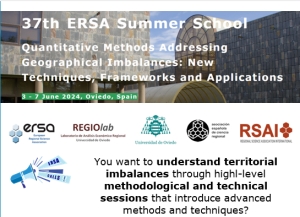





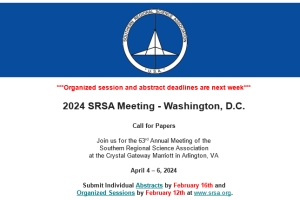

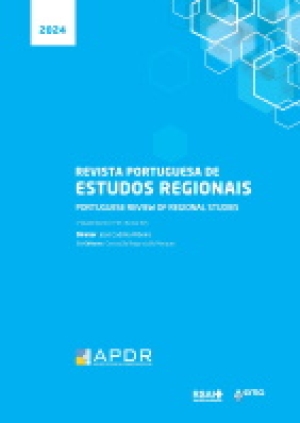



 BE PART OF IT !
BE PART OF IT !

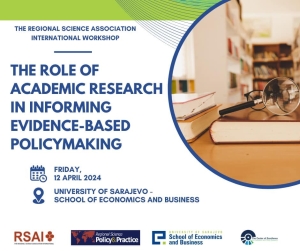
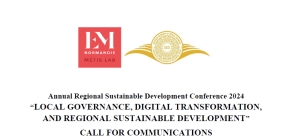
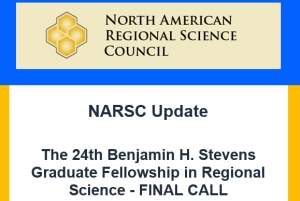



 Dear Members of ERSA, dear Colleagues,
Dear Members of ERSA, dear Colleagues,













